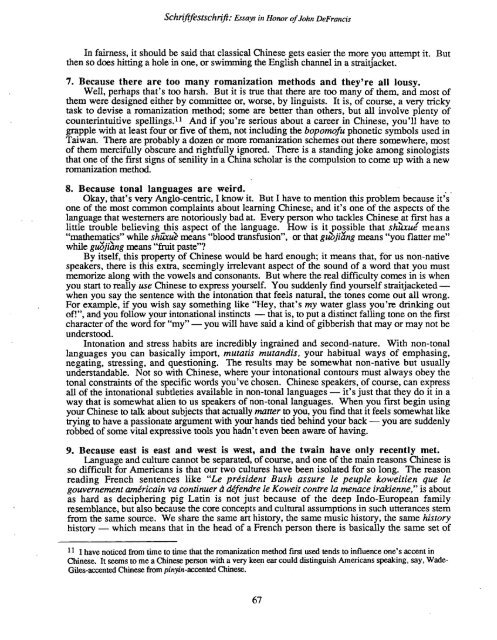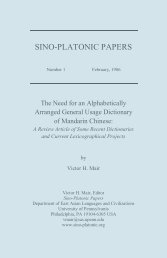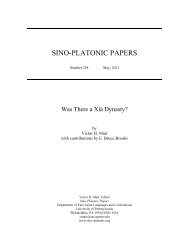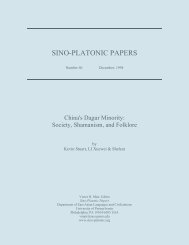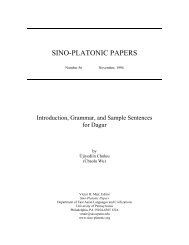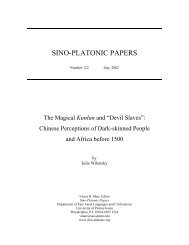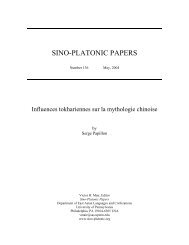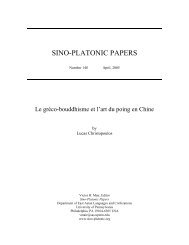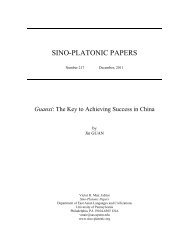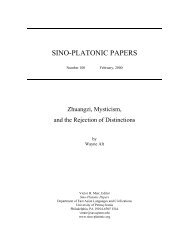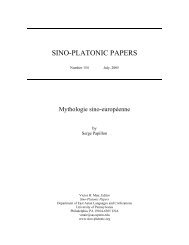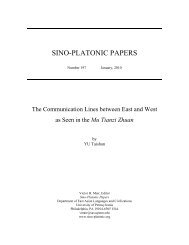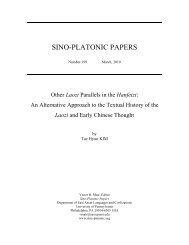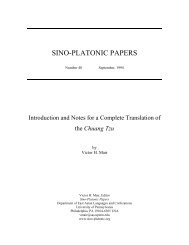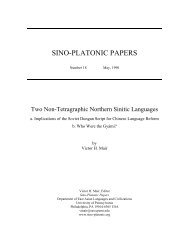Essays on Writing and Language in Honor - Sino-Platonic Papers
Essays on Writing and Language in Honor - Sino-Platonic Papers
Essays on Writing and Language in Honor - Sino-Platonic Papers
Create successful ePaper yourself
Turn your PDF publications into a flip-book with our unique Google optimized e-Paper software.
Schri!esesrschrihriji: Ersqs <strong>in</strong> H<strong>on</strong>or of John DeFrancis<br />
In fairness, it should be said that classical Ch<strong>in</strong>ese gets easier the more you attempt it. But<br />
then so does hitt<strong>in</strong>g a hole <strong>in</strong> <strong>on</strong>e, or swimm<strong>in</strong>g the English channel <strong>in</strong> a straitjacket.<br />
7. Because there are too many romanizati<strong>on</strong> methods <strong>and</strong> they're all lousy.<br />
Well, perhaps that's too harsh. But it is true that there are too many of them, <strong>and</strong> most of<br />
them were designed either by committee or, worse, by l<strong>in</strong>guists. It is, of course, a very tricky<br />
task to devise a romanizati<strong>on</strong> method; some are better than others, but all <strong>in</strong>volve plenty of<br />
counter<strong>in</strong>tuitive spell<strong>in</strong>gs.11 And if you're serious about a career <strong>in</strong> Ch<strong>in</strong>ese, you'll have to<br />
grapple with at least four or five of them, not <strong>in</strong>clud<strong>in</strong>g the bopomofu ph<strong>on</strong>etic symbols used <strong>in</strong><br />
Taiwan. There are probably a dozen or more romanizati<strong>on</strong> schemes out there somewhere, most<br />
of them mercifully obscure <strong>and</strong> rightfully ignored. There is a st<strong>and</strong><strong>in</strong>g joke am<strong>on</strong>g s<strong>in</strong>ologists<br />
that <strong>on</strong>e of the fust signs of senility <strong>in</strong> a Ch<strong>in</strong>a scholar is the compulsi<strong>on</strong> to come up with a new<br />
romanizati<strong>on</strong> method.<br />
8. Because t<strong>on</strong>al languages are weird.<br />
Okay, that's very Anglo-centric, I know it. But I have to menti<strong>on</strong> this problem because it's'<br />
<strong>on</strong>e of the most comm<strong>on</strong> compla<strong>in</strong>ts about learn<strong>in</strong>g Ch<strong>in</strong>ese; <strong>and</strong> it's <strong>on</strong>e of the aspects of the<br />
language that Westerners are notoriously bad at. Every pers<strong>on</strong> who tackles Ch<strong>in</strong>ese at first has a<br />
little trouble believ<strong>in</strong>g this aspect of the language. How is it possible that shhue' means<br />
\ ..v<br />
"mathematics" while shkd means "blood transfusi<strong>on</strong>", or that gwpang means "you flatter me"<br />
while gGj&zg means ''fruit paste"?<br />
By itself, this property of Ch<strong>in</strong>ese would be hard enough; it means that, for us n<strong>on</strong>-native<br />
speakers, there is this extra, seem<strong>in</strong>gly irrelevant aspect of the sound of a word that you must<br />
memorize al<strong>on</strong>g with the vowels <strong>and</strong> c<strong>on</strong>s<strong>on</strong>ants. But where the real difficulty comes <strong>in</strong> is when<br />
you start to really me Ch<strong>in</strong>ese to express yourself. You suddenly f<strong>in</strong>d yourself straitjacketed -<br />
when you say the sentence with the <strong>in</strong>t<strong>on</strong>ati<strong>on</strong> that feels natural, the t<strong>on</strong>es come out all wr<strong>on</strong>g.<br />
For example, if you wish say someth<strong>in</strong>g like "Hey, that's my water glass you're dr<strong>in</strong>k<strong>in</strong>g out<br />
of!", <strong>and</strong> you follow your <strong>in</strong>t<strong>on</strong>ati<strong>on</strong>al <strong>in</strong>st<strong>in</strong>cts - that is, to put a dist<strong>in</strong>ct fall<strong>in</strong>g t<strong>on</strong>e <strong>on</strong> the first<br />
character of the word for "my" - you will have said a k<strong>in</strong>d of gibberish that may or may not be<br />
understood.<br />
Int<strong>on</strong>ati<strong>on</strong> <strong>and</strong> stress habits are <strong>in</strong>credibly <strong>in</strong>gra<strong>in</strong>ed <strong>and</strong> sec<strong>on</strong>d-nature. With n<strong>on</strong>-t<strong>on</strong>al<br />
languages you can basically import, muratis mut<strong>and</strong>is, your habitual ways of emphas<strong>in</strong>g,<br />
negat<strong>in</strong>g, stress<strong>in</strong>g, <strong>and</strong> questi<strong>on</strong><strong>in</strong>g. The results may be somewhat n<strong>on</strong>-native but usually<br />
underst<strong>and</strong>able. Not so with Ch<strong>in</strong>ese, where your <strong>in</strong>t<strong>on</strong>ati<strong>on</strong>al c<strong>on</strong>tours must always obey the<br />
t<strong>on</strong>al c<strong>on</strong>stra<strong>in</strong>ts of the specific words you've chosen. Ch<strong>in</strong>ese speakers, of course, can express<br />
all of the <strong>in</strong>t<strong>on</strong>ati<strong>on</strong>al subtleties available <strong>in</strong> n<strong>on</strong>-t<strong>on</strong>al languages - it's just that they do it <strong>in</strong> a<br />
way that is somewhat alien to us speakers of n<strong>on</strong>-t<strong>on</strong>al languages. When you first beg<strong>in</strong> us<strong>in</strong>g<br />
your Ch<strong>in</strong>ese to talk about subjects that actually matter to you, you f<strong>in</strong>d that it feels somewhat like<br />
try<strong>in</strong>g to have a passi<strong>on</strong>ate argument with your h<strong>and</strong>s tied beh<strong>in</strong>d your back - you are suddenly<br />
robbed of some vital expressive tools you hadn't even been aware of hav<strong>in</strong>g.<br />
9. Because east is east <strong>and</strong> west is west, <strong>and</strong> the twa<strong>in</strong> have <strong>on</strong>ly recently met.<br />
<strong>Language</strong> <strong>and</strong> culture cannot be separated, of course, <strong>and</strong> <strong>on</strong>e of the ma<strong>in</strong> reas<strong>on</strong>s Ch<strong>in</strong>ese is<br />
so difficult for Americans is that our two cultures have been isolated for so l<strong>on</strong>g. The reas<strong>on</strong><br />
read<strong>in</strong>g French sentences like "Le prksident Bush assure le peuple koweitien que le<br />
gouvernement amkrica<strong>in</strong> va c<strong>on</strong>t<strong>in</strong>uer d &fendre le Koweit c<strong>on</strong>tre la menace irakienne," is about<br />
as hard as decipher<strong>in</strong>g pig Lat<strong>in</strong> is not just because of the deep Indo-European family<br />
resemblance, but also because the core c<strong>on</strong>cepts <strong>and</strong> cultural assumpti<strong>on</strong>s <strong>in</strong> such utterances stem<br />
from the same source. We share the same art history, the same music history, the same history<br />
history - which means that <strong>in</strong> the head of a French pers<strong>on</strong> there is basically the same set of<br />
I have noticed fiom time to time that the romanizati<strong>on</strong> method first used tends to <strong>in</strong>fluence <strong>on</strong>e's accent <strong>in</strong><br />
Ch<strong>in</strong>ese. It seems to me a Ch<strong>in</strong>ese pers<strong>on</strong> with a very keen ear could dist<strong>in</strong>guish Americans qdang, say, Wade-<br />
Giles-accented Ch<strong>in</strong>ese fiom p<strong>in</strong>y<strong>in</strong>-accented Ch<strong>in</strong>ese.<br />
67


